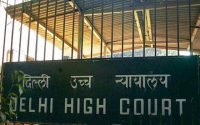Recently, Delhi’s administration was in a limbo for days due to a dharna staged by Chief Minister Arvind Kejriwal and his Cabinet ministers over the issue of the Lieutenant Governor (L-G) Anil Baijal’s alleged intervention in the elected AAP government’s functioning. The Delhi government, therefore, asked for a clear demarcation of powers between the L-G and itself.
Hurry Up, SC! Only You Can Solve Delhi’s Administration Crisis
Source – thequint.com
In November 2017, a five-judge Constitution bench of the Supreme Court (SC) headed by CJI Dipak Misra heard a batch of pleas on who enjoys supremacy over the administration of Delhi, and reserved verdict on 6 December the same year. Over six months have passed since without a verdict.
This has far-reaching implications for the people of Delhi as the administration continues to be hamstrung by a lack of clarity over division of power.
SC Must Prioritise This Issue
The original jurisdiction of the SC is provided under Article 131 of the Constitution, and allows for inter-state and state-Centre disputes to be filed directly before the SC. This also means that disposal of such disputes has to be given priority by the apex court.
This status of Union Territory was altered for Delhi after incorporation of Article 239 AA by means of the 69th Constitutional Amendment Act, which brought with itself an unclear division of power. This has led to a heightened tussle in recent times due to different ruling party-dynamics at the Centre and Delhi.
This tussle went to the Delhi High Court, which declared that the LG as an administrative head of Delhi not bound by the Council of Minister’s advice. Aggrieved, the Delhi government approached the Supreme Court, which has reserved its judgment since 6 December 2017.
Delhi’s altered status now makes this dispute a case similar to a Centre-State dispute which requires quick disposal on a priority basis – an indicator being the gap between reserving judgment, and delivery of judgment.
No Timeframe in Sight
Code of Civil Procedure, 1908, provides for up to 30 days time between arguments being completed and judgment being delivered, while no such limit is prescribed in criminal cases under the Code of Criminal Procedure, 1974. Although no such provision exists for the HCs and the SC, the SC set a time limit for the HCs in Anil Rai v. State of Bihar where parties can seek ‘early judgment’ if it is not delivered within three months after being reserved, and a reference to the Chief Justice for re-hearing, in case of a delay of six months.
However, the SC has itself failed to adhere to the timeframe that it prescribed for the HCs. Here are some instances: the SC took 433 days in directing former PM Manmohan Singh to grant sanction to prosecute the telecom minister in the 2G spectrum scam; it took 624 days in deciding an appeal against a Delhi HC judgment on the Naz Foundation case on the validity of Section 377 of the Indian Penal Code.
The Delhi administration issue has come to prominence because the issues arising out of it have far-reaching consequences. Much of the debate is focused on problems due to power division, rather than critiquing the work done by the government in public interest. But this problem could be settled if the Supreme Court delivers its long-reserved verdict!



